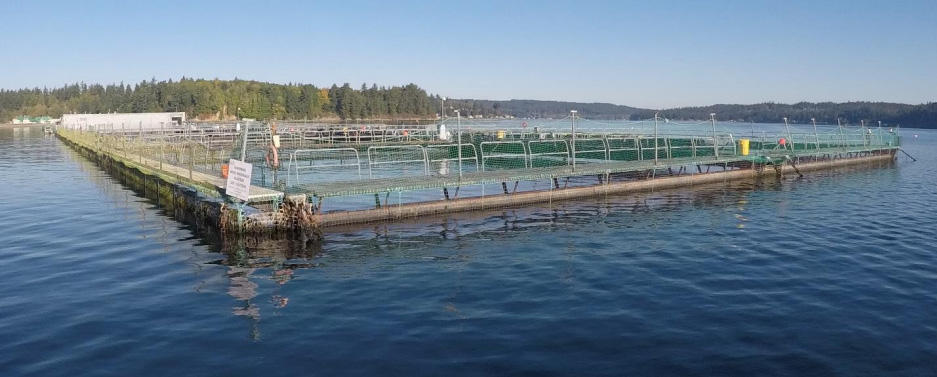
The head of Cooke Aquaculture says he’s furious about “scare tactics” that he says are driving a push to end Atlantic salmon farming in Puget Sound.
The Washington Senate voted 35-12 Thursday to phase out aquatic leases for net pens holding non-native fish.
The August collapse and massive escape from Cooke net pens near Anacortes, Washington, energized Atlantic salmon farming opponents at the Washington Legislature.
Cooke Aquaculture CEO Glenn Cooke and other company leaders watched from the Senate gallery as a bipartisan majority effectively voted to boot the company’s operations out of Washington waters.
The charge was led by Democratic Sen. Kevin Ranker.
“If we want to talk about protecting jobs, what we need to do is protect our Salish Sea and get these net pens out of the water,” Ranker said.
“It was foolishness,” Cooke said. “It was incredible, some of the charges and comments.”
Cooke flew in from New Brunswick, Canada, where his family’s multinational seafood company is based.
“Think of this, this is the United States of America and you’re banning an industry?” he said.
Cooke said the net pen failure off Cypress Island last August was an aberration for his company. He disputes that escaped Atlantic salmon pose a risk of colonization or competition with native Pacific salmon.
He also disputes the frequent charge that net pens spread disease or pollution.
Cooke said about 180 jobs in fish production and processing are at risk if the state of Washington terminates all of Cooke Aquaculture’s Atlantic salmon farm leases.
The lively state Senate debate Thursday centered on the potential risks to struggling wild salmon stocks posed by farming Atlantic salmon in Pacific Northwest waters.
The legislation sponsored by Ranker would ban new aquatic leases for farming of non-native fish and forbid the renewal of existing state leases when they expire.
“In the months since the escape of hundreds of thousands of invasive Atlantic salmon from the net pen failure, we have learned the extent of the mismanagement and negligence of Cooke Aquaculture,” Ranker said. “This sort of careless behavior is unacceptable for any company in Washington state. The state ban is a strong stance to ensure the protection of our marine environment and native salmon populations in the Salish Sea.”
Senators on the losing side argued that the ban is based on questionable science and ignores less punitive options such as requiring non-native fish aquaculture rear only a single sex to eliminate the possibility of reproduction by escapees.
“I am very, very disappointed that the path forward today is the closure of an industry that has been very good to the state of Washington,” Republican state Sen. Judy Warnick said.
The Senate legislation now goes to the state House for further consideration. Various state representatives previously introduced a range of proposals from more severe to less ambitious, none of which have advanced very far.
Gov. Jay Inslee went on the record Thursday in support of the state Senate’s approach to ending leases for Atlantic salmon farms. He said he was motivated to speak out after reading the state’s investigative report on the Cypress Island net pen collapse.
“What we saw is a catastrophic failure due to a, in my opinion, very negligent failure to maintain these pens,” Inslee said. “What it told me is that we are going to see failures in the future if we continue down this road. They are inevitable given the tides, and the consequences of lack of maintenance, and the fact that we can’t have inspectors out there every single day.”
Western Washington tribes are also actively advocating for an end to Atlantic salmon aquaculture in the state.
Cooke raises Atlantic salmon at four locations around western Washington, as well as in Maine, Canada, Chile and Scotland.
The family-owned Canadian company took over the Washington locations in 2016 after buying Seattle-based Icicle Seafoods. Cooke is now the only commercial-scale operator of Atlantic salmon net pens in Washington waters.
Washington’s Department of Natural Resources is in the midst of reviewing all of Cooke’s leases in local waters. After inspecting the Port Angeles and Cypress Island facilities, the agency notified Cooke that it would terminate those leases as soon as the company could safely wind down operations. The termination letters cited numerous breaches of the lease terms including another net pen allegedly “in danger of catastrophic failure” off Cypress Island.
“We have fish there to grow out and harvest and we’re going to be allowed to do that,” Cooke said in an interview Thursday. “In the end, I am hoping that we can come to some kind of resolution with the commissioner of public lands and her department that she can live with, feel happy with and we can.”
Cooke said many of the existing net pens his company inherited from Icicle Seafoods are slated to be replaced and upgraded.
Oregon, California and Alaska effectively ban saltwater fish farms in their waters.
